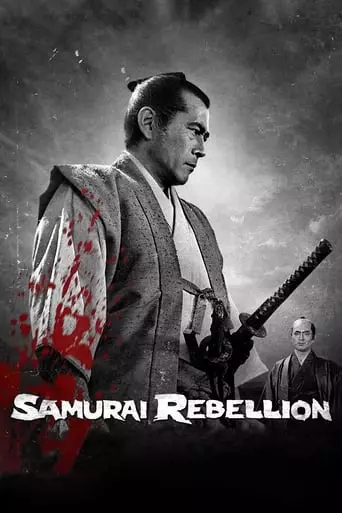
Samurai Rebellion (1967) Watch Online Free
The mother of a feudal lord’s only heir is kidnapped away from her husband by the lord. The husband and his samurai father must decide whether to accept the unjust decision, or risk death to get her back.
Samurai Rebellion (1967), directed by Masaki Kobayashi, is a poignant samurai film set in feudal Japan. The film is a sharp commentary on social conformity, oppression, and the conflict between personal duty and moral integrity.
The story revolves around Isaburo Sasahara (Toshiro Mifune), a seasoned samurai who serves under the oppressive Lord Matsudaira. In a period of peace, Isaburo is burdened with monotonous tasks like sword testing and record reviewing. However, when Lord Matsudaira orders Isaburo’s son, Yogoro (Go Kato), to marry Lady Ichi (Yoko Tsukasa), the lord’s disfavored mistress, a series of events begins to unfold that pits personal values against feudal loyalty.
Yogoro and Ichi initially despise the arrangement, but over time, they develop a deep love for each other. However, when the lord demands Ichi’s return, the Sasahara family is thrown into a tragic conflict. Isaburo is forced to decide between his loyalty to his lord and his love for his son and daughter-in-law, leading to an inevitable and tragic rebellion.
Samurai Rebellion is a masterful exploration of the rigid societal structure of the Tokugawa shogunate. The film delves into themes of oppression, loyalty, and individual agency. The samurai, once warriors of honor and freedom, are now subjects to an unyielding code that suppresses personal desires. The use of space and framing in Kobayashi’s direction—where interior shots feel cramped and exterior shots are expansive—symbolizes the entrapment of the characters within a system that prioritizes duty over personal freedom.
The film also explores the destructive nature of blind obedience. Isaburo’s transformation from a compliant samurai to a defiant father is a central narrative arc, revealing the emotional and psychological toll that the feudal system takes on its individuals. The act of rebellion, sparked by the love between Yogoro and Ichi, becomes an expression of humanity and a rejection of authoritarianism. In the end, the film paints a portrait of the samurai as victims of an oppressive and unfeeling system, torn between duty and morality.
Samurai Rebellion is a haunting and emotionally charged experience. The stark portrayal of loyalty versus personal freedom can evoke a profound sense of melancholy, especially as you witness the destructive consequences of a system that demands blind obedience. You might feel moved by the tragic fate of the characters and reflect on how personal values often come into conflict with larger societal forces. The film’s themes of love, sacrifice, and rebellion are likely to linger long after the credits roll, leaving you with a sense of sadness and admiration for the courage of the characters who defy oppressive systems for love and justice.
Overall, Samurai Rebellion is not only a beautiful piece of cinema but also a deeply human story that invites introspection about the complexities of loyalty, duty, and the cost of rebellion.
